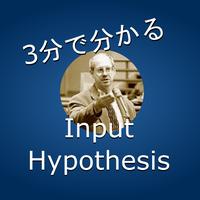Input Hypothesis インプット 仮説 に ついて
|||かせつ||
Input Hypothesis
Hipótese de entrada
三 分 で 学ぶ スティーブン ・クラッシェン の 「インプット 仮説」。
みっ|ぶん||まなぶ|||||かせつ
The Input Hypothesis by Steven Krashen in Three Minutes.
今回 は 第 二 言語 習得 理論 の 中心 と なる 考え 方 「インプット 仮説 」に ついて 手短に お 話 を して いきたい と 思います。
こんかい||だい|ふた|げんご|しゅうとく|りろん||ちゅうしん|||かんがえ|かた||かせつ|||てみじかに||はなし|||||おもいます
|||||||||||||||||briefly|||||||
This time, I would like to briefly talk about the "input hypothesis", which is central to the theory of second language acquisition.
この 「インプット 仮説 」と いう もの は 五 つ の 仮説 に よって 成り立って います。
||かせつ|||||いつ|||かせつ|||なりたって|
This "input hypothesis" consists of five hypotheses.
こちら の 五 つ に なります。
||いつ|||
Here are five.
この 動画 で は それぞれ の 概要 と 結論 だけ を 説明 して いきます。
|どうが|||||がいよう||けつろん|||せつめい||
||||||summary|||||||
In this video, I will only explain the outline and conclusion of each.
では まず 習得 学習 仮説 と いう もの に ついて 見て いきます。
||しゅうとく|がくしゅう|かせつ||||||みて|
Let's start by looking at the acquisition-learning hypothesis.
習得 学習 仮説 と は 何かと いう と 、知識 の 吸収 に は 学習 と 習得 の 二 つ の 種類 が ある と クラッシェン が 言った こと です。
しゅうとく|がくしゅう|かせつ|||なにかと|||ちしき||きゅうしゅう|||がくしゅう||しゅうとく||ふた|||しゅるい||||||いった||
What is the acquisition learning hypothesis? Krashen said that there are two kinds of knowledge absorption: learning and acquisition.
そして 学習 と は 何かと いう と 、意識 的な プロセス で 学ぶ こと 、即 ち 単語 暗記 したり と か 文法 規則 を 覚えたり と か 、それ を テスト に よって 確かめたり と か 何度 も 何度 も 繰り返して 練習 したり と か そういった 学習 の プロセス。
|がくしゅう|||なにかと|||いしき|てきな|ぷろせす||まなぶ||そく||たんご|あんき||||ぶんぽう|きそく||おぼえたり|||||てすと|||たしかめたり|||なんど||なんど||くりかえして|れんしゅう|||||がくしゅう||ぷろせす
||||||||||||||also||||||||||||||||||||||||||||||||
Learning is learning through a conscious process, such as memorizing words, memorizing grammar rules, checking them by taking tests, and practicing over and over again. Such a learning process.
もう 一 つ が 習得 の プロセス で 単純に 読み 聞き を して いる と 自然 と 身 に ついていく 無意識 的な プロセス と いう こと に なります。
|ひと|||しゅうとく||ぷろせす||たんじゅんに|よみ|きき|||||しぜん||み|||むいしき|てきな|ぷろせす|||||
The other is the process of acquisition, which is an unconscious process that naturally follows through simple reading and listening.
例えば スポーツ と か 音楽 の ような いつ 自分 が 身 に つけた の か を わから ない 、そういった 知識 の 身 に つけ 方 の 二 つ が ある と いう 風 に 言った 訳 です。
たとえば|すぽーつ|||おんがく||||じぶん||み|||||||||ちしき||み|||かた||ふた||||||かぜ||いった|やく|
For example, I said that there are two ways to acquire knowledge, such as sports and music, where you don't know when you acquired it.
クラッシェン が 言った ことって いう の は 、言葉 は 習得 に よって 身 に つく んだ よ と いう こと です。
||いった|||||ことば||しゅうとく|||み||||||||
What Krashen said is that the language is learned by learning.
学習 で は 身 に つか ない んだ よ と いう こと で も あります。
がくしゅう|||み|||||||||||
It also means that you can't learn by learning.
それでは 自然 習得 順序 仮説 と いう こと に ついて 見て いきましょう。
|しぜん|しゅうとく|じゅんじょ|かせつ||||||みて|
||acquisition|order|hypothesis (1)|||||||
Let's take a look at the natural learning order hypothesis.
自然 習得 順序 仮説 と は 、もし 言葉 を 習得 を して いた 場合 一定 の 順序 に 従って 言葉 が 身 に 付いていく と いう こと です。
しぜん|しゅうとく|じゅんじょ|かせつ||||ことば||しゅうとく||||ばあい|いってい||じゅんじょ||したがって|ことば||み||ついていく||||
|acquisition|order|hypothesis (1)||||||acquisition|||||certain||||accordingly|||||will follow||||
The natural order of acquisition hypothesis is that if you learn a language, you will learn it in a certain order.
これ は ネイティブ の 子ども たち を 観察 した 結果 、文法 の 学習 に 一定 の 順序 が あった と いう こと から 導き 出された 仮説 に なります。
||||こども|||かんさつ||けっか|ぶんぽう||がくしゅう||いってい||じゅんじょ|||||||みちびき|だされた|かせつ||
|||||||observation||||||||||||||||guided||||
This is a hypothesis derived from observations of native-speaking children and the fact that they learned grammar in a certain order.
習得 と 学習 と いう の は 、知識 を 身 に つける プロセス が 異なる のだ。
しゅうとく||がくしゅう|||||ちしき||み|||ぷろせす||ことなる|
Acquisition and learning are different processes of acquiring knowledge.
やはり 習得 と 学習 と いう の は 別の もの な のだ と いう 風 に 言って いる 訳 です。
|しゅうとく||がくしゅう|||||べつの||||||かぜ||いって||やく|
After all, I'm saying that acquisition and learning are two different things.

